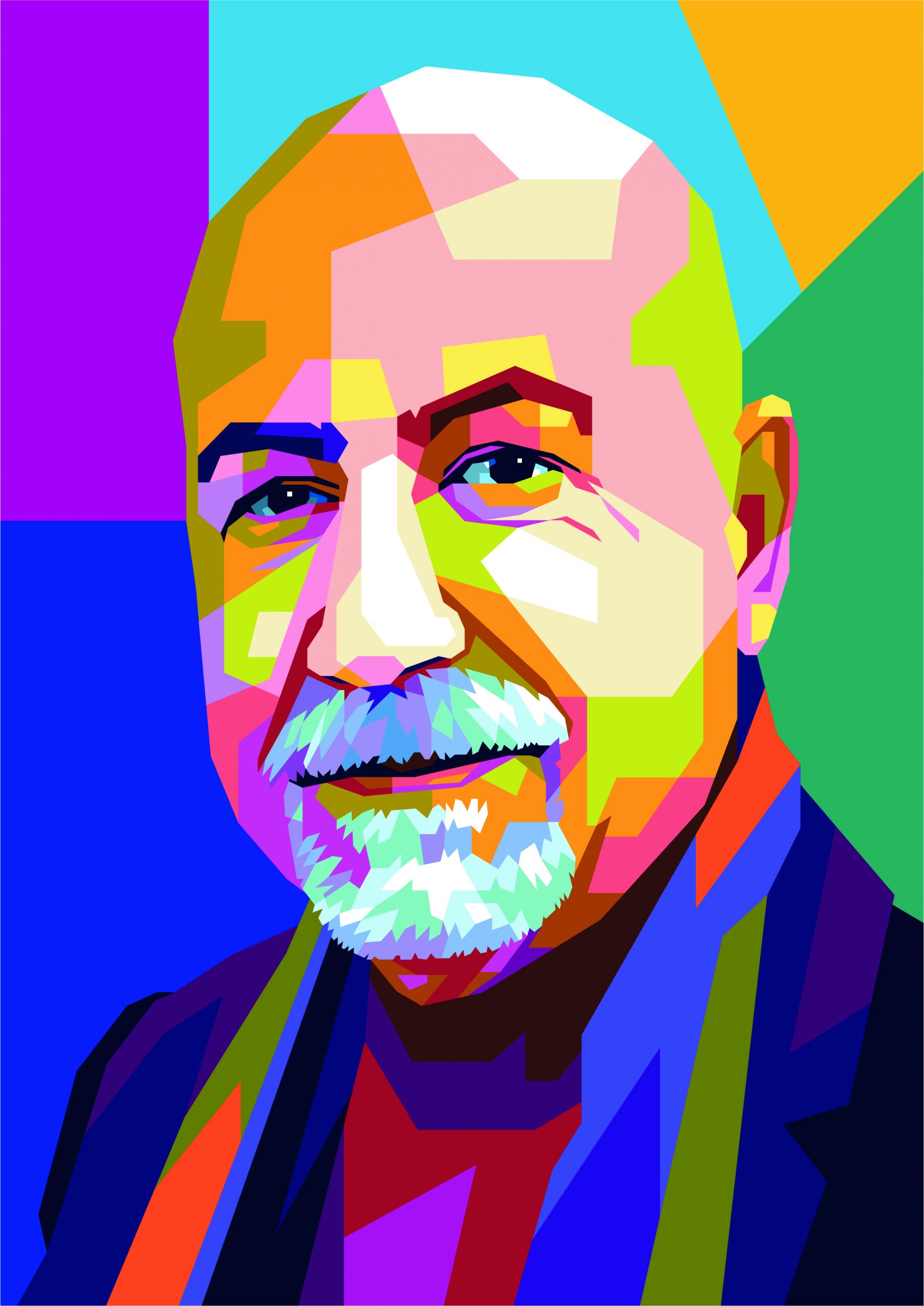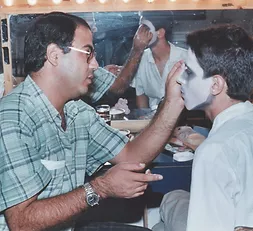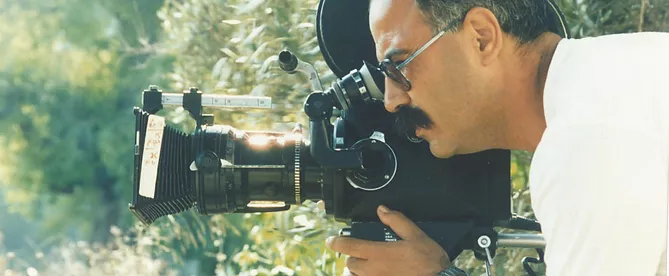Fouad Awad
Theatre Director, Creative Director, Scenographer, Dramaturge
Fouad Khalil Awad Nimer is a theatre and a creative director who was born in the city of Nazareth. In 1979, and during his freshman year at the university, he made his directorial debut with the production “The King is The King” (based on a novel by the late Syrian playwright Saad Allah Wannous). He earned his Bachelor of Fine Arts degree from Tel Aviv University in 1983. While at Tel Aviv University, he directed “Miss Julie” written by August Strindberg and “Men in the Sun” written by the Palestinian writer, Ghassan Kanafani. “Men in the Sun” deals with the journey of four Palestinians seeking to travel to Kuwait in a hope of finding a job there during the oil boom.
After graduating from Tel Aviv University in 1983, he returned to his hometown Nazareth, where he worked on cultivating theatre culture and arts among the Palestinian and Arab community in the country. During that period he chiseled his social and national identity and formed a cultural identity in which the Palestinian cause is a centerpiece.


During this period he worked at the Municipal Cultural Centre in Nazareth and alongside Riyad Massarwa, they formed the first drama and theatre school, named “Theatre Studio” which managed to draw a number of young men and women who later on joined the professional group of the centre, which went on to produce numerous theatre production which formed as the basis of the theatrical movement in the country.
In 1986 he directed “A Song of a Deformed Soldier” which constituted a turning point in the theatrical production, combining sundry forms of theatrical art such puppets and masks. The play dealt with the compulsory military service amongst the Druze community in the Israeli army and it was banned by the Israeli arts censorship, an act that would encourage him and would make him more determined to lead the Palestinian theatrical movement and shape it to

He worked in numerous professional theatres nationally and internationally. Among the plays he directed “The Dervishes are Looking for the Truth” written by the Syrian writer, Mustafa Al Hallaj as well as “Ashater Hasan” based on the folktale known by the same title. In 1987 he directed “Birds”, a play written by Ibrahim Khalaileh which deals with the Palestinian desire to break free from the Israeli occupation, the play toured Germany and Holland. In 1989, Awad received “Best Theatre Director” award as well as “Best Theatre Production” award for the play “Jaber’s Head” from Acre Theatre Festival.
He directed The Alley in collaboration with Samia Kazmouz Bakri, which deals with the expatriation of Palestinians and the memories of one’s home and city; places undergoing demographic changes. In 1993 he directed “The Night and The Mountain” written by Abed Alghaffar Makawi, which is a Yemeni legend dealing with the fear caused by occupation. In 1994, he directed “Romeo and Juliet” by William Shakespeare, a play that opened Lille Festival in France. Both plays were considered a huge success and received international acclaim.
In 1998, he directed a play by the name “Le Montrer” for Almidan Theatre. The play – which is about the humanization and rebellion of an artist’s marionettes and their attempt to poison him – was written by Andrée Chedid.
In 1999 he directed “Abeir File No.96/63”, a play based on the novel “The Collector” by the British author John Fowles. The play portrays the Israeli-Palestinian conflict; a settler kidnaps a Palestinian artist and holds her in a public bunker, with the claim that he wants to live with her in peace, which is impossible. The play harvested success and recognition due to the boldness in which the play addresses the Israeli occupation of Palestine. The play can be described in terms of production as confluence of cinema and theatre, where a cinematic footage is embedded in a theatrical production.
He took part in numerous international workshops and fellowships including the Royal Court in London.
He established and worked as the creative and artistic director of Al Midan theatre in Haifa, the largest professional theatre in country. During that time he brought in tens of artists, actors, directors, musicians, set designers, costume designers, sound and light engineers. During his tenure at Al Midan theatre, he catapulted the theatre to prominence and consequentially becoming a leading theatre serving as the national theatre for the Palestinian minority in Israel.
He established and ran numerous theatre projects including Nazareth Centre for Arts and Culture, Al Midan Local Theatre Festival, Nazareth International Children’s Theatre Festival.
He conducted a research on the Israeli-Palestinian Conflict in Theatre, and presented it at the Arab Theatre Institute in Amman in 2014.
He participated in international festivals and conventions including Carthage International Festival, Avignon Festival, Centre Pompidou, Rabat, London, Jerusalem and other cities around the world.
In 2015 and 2016 he was selected as a judge at The Arab Institute Festival that was held in Kuwait which drew theatre companies from around the Arab world, celebrating the 16th of January marked by the Arab Theatre Institute in al Sharjah as the Arab Theatre Day. He was selected as one the best and most influential Palestinian and Arab threatre director in the world.
The Arab Theatre Institute published his book “Law Kont…!?” A Theatrical Biography, in which he sheds light on the Palestinian Theatrical Movement in the Country.
In 2016 he shifted his focus on children’s theatre and produced, directed and did the scenography for a number of plays: Rihlat Alkharnaq (Bunny’s Journey) produced by Al Khayal Theatre, Pinky and Brain produced by Ensemble Fringe Theatre Nazareth, Al Karakouz Al Kaslan (The Lazy Karakouz) produced by Al Jawal Theatre Sakhnin, Lice and Laus’s Journey, The Sad Lobster Looking for Friends both produced by Yalla Foundation in Nazareth, The Fisherman and the Fish produced by Al Khayal Theatre.
In 2017 he was awarded “Kippud Hazahav” award for Best Director for productions that broke social and political norms, naming him one of the most influential theatre directors in the country. This award is considered the most prestigious award by the Fringe Theatre Guild in the country.
In 2018 he was invited to participate in Carthage International Festival to showcase the puppets produced for The Lazy Karakouz.
He is a member of the high committee of the Palestinian Theatre National Festival an initiative by the Arab Theatre Institute and the Palestinian Ministry of Culture.
Nowadays he works as the manager of Mahmoud Darwish Cultural Centre in Nazareth which is the oldest and largest cultural centre in the country and is comprised of different venues for music, gallery, folklore and contemporary dance. And he teaches acting and theatre at the Fringe Academy in Nazareth for the 3rd year in a row.
